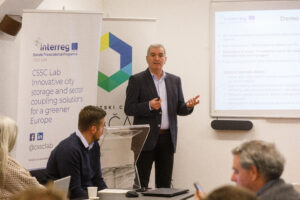The international CSSC Lab project presented its main results at the final conference on 10-11 November in Bračak, Croatia. A joint initiative of 17 partners from 11 European countries called CSSC Lab is coming to an end. Thanks to almost three years of intensive collaboration, a number of very useful techniques and tools have been developed to support the development of technological solutions for municipalities and cities in the field of sector coupling and energy storage. These topics are also current priorities for mitigating the effects of the energy crisis in Europe.

“The idea of our project goes back five years, when sector coupling and energy storage at municipal level was not a hot topic“, says Marko Čavar, managing partner of CSSC Lab. “The timing of our initiative, which was supported by the Danube Transnational Programme grant, corresponds exactly with the start of the energy crisis after the infamous events of earlier this year. A few months afterwards, we saw a huge increase in interest in the results of our project in all partner regions and it was undeniably easier for us to fill our training capacities, for example. At the same time, however, we were also able to better target the measures that were developed in the framework of the so-called regional action plans, i.e. some kind of guidelines for coordinated action at regional level“, adds Marko Čavar.
The final conference took place on 10-11 November in the sensitively restored premises of the historic castle in Bračak, known as the Energy Centre Bračak, where the CSSC Lab’s lead partner, the Croatian company REGEA, is also based. The event was simultaneously streamed online for those who were unable to attend.
“We presented key outputs of the project, such as a set of proposed measures in each region, an electronic tool for selecting the appropriate technology, a set of trainings for the municipal sector, our online knowledge platform and dissemination activities“, says Marko Čavar. “However, we are most proud of the successful implementation of four specific technology investments, which serve as a reference of good practice for the public. These are installations using sector coupling and energy storage principles in Austria, Bulgaria, Croatia and Slovenia“, adds Marko Čavar.
More information about the project and its outputs can be found at www.cssclab.eu.
Hi-res photos: https://www.dropbox.com/sh/2bxbxu27t79as22/AACCWU5D4CdqvWBzvlXTIQSoa?dl=0
About CSSC Lab
CSSC Lab is an initiative implemented by 17 partners in11 countries, aiming to accelerate the up-take of CSSC solutions in Danube region cities. At present, there are few sector coupling initiatives because public authorities possess little knowledge on the subject tend shy away from the associated investment risks. To overcome these barriers, the CSSC Lab project plans to conduct a capacity building programme for municipalities and to demonstrate the viability of CSSC solutions for medium-sized and smaller cities in the Danube region.


